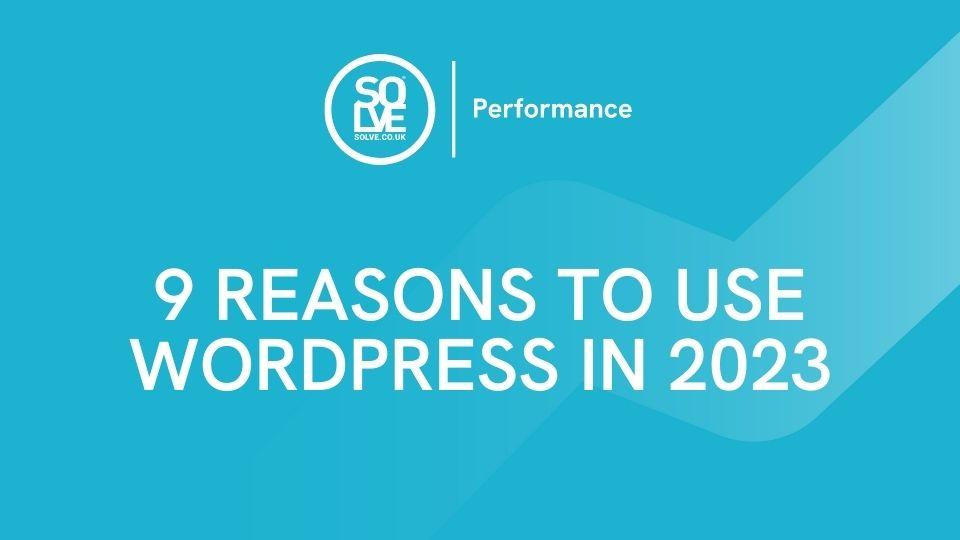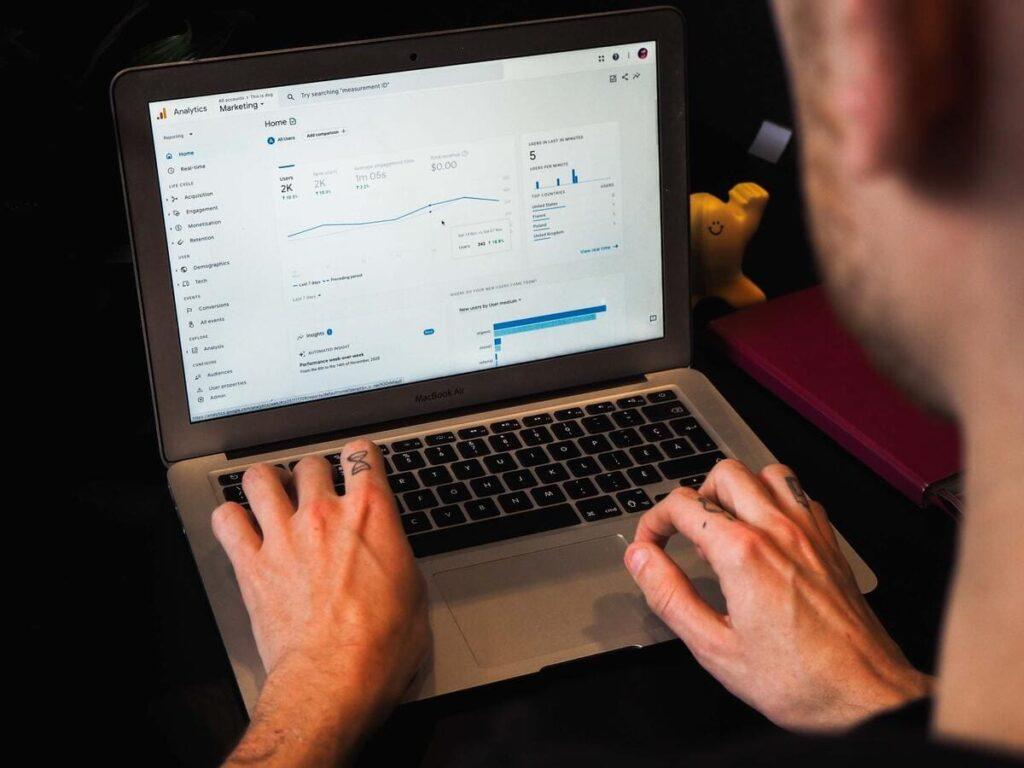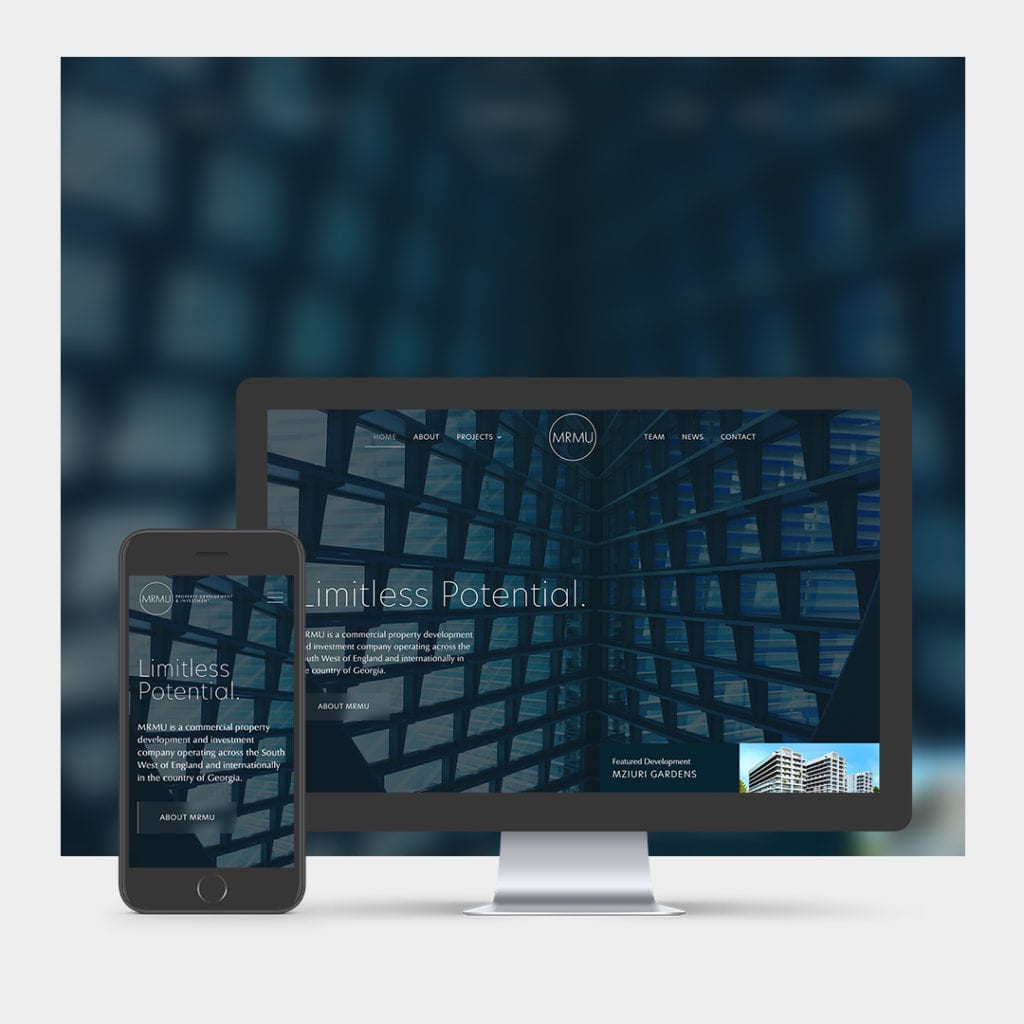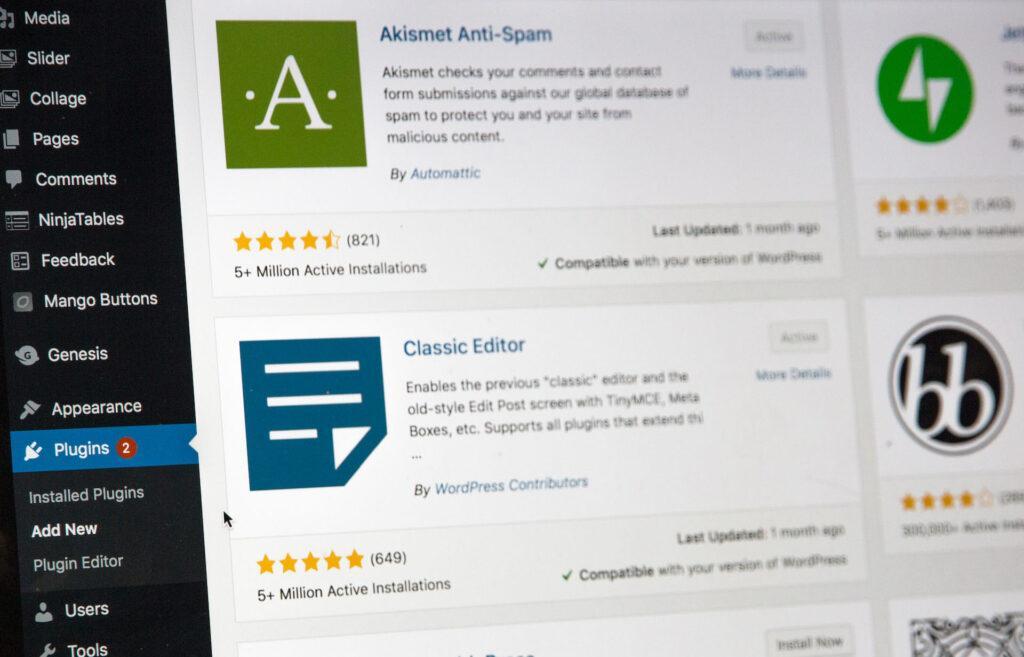
Are you on the fence about using WordPress for your website? You’re not alone. Many people are unsure about whether WordPress is the right choice for their website, especially as new website building platforms and technologies continue to emerge. The market is crowded – from Wix to Squarespace, the options are endless and all of them promise to be the best option for you. So often the question clients come to us with is ‘why should I use WordPress?’.
Out of all the options, WordPress remains one of the most popular and powerful website builders on the market, and for good reason. In this blog post, we’ll be discussing 9 reasons why you should consider using WordPress in 2024. From its ease of use to its search engine optimisation capabilities, there are many reasons why it’s the perfect choice for your website. So, whether you’re a business owner, a blogger, or just someone looking to build a website, read on to learn why WordPress is likely the right choice for you.
Contents
WordPress is the world’s most popular CMS – accounting for 62.9% of websites that use a CMS.
What is WordPress?
WordPress is an open-source content management system (CMS) that provides an interface for users to create, manage and modify digital content on websites without requiring any coding knowledge, typically through a backend admin panel. First launched in 2003, WordPress has grown to become the most popular website building platform in the world, powering over 62.9% of all websites that use a CMS (W3Techs.com).
9 Reasons to use WordPress
So, why should you choose WordPress as your website building platform? Here are 9 compelling reasons that make WordPress the right choice for your website in 2024:
- WordPress is customisable, flexible and scalable
- WordPress is easy to use & maintain
- WordPress has a super helpful and friendly community
- WordPress is free
- WordPress is popular
- WordPress is receptive to search engines & great for SEO
- WordPress can be used to build any type of site
- WordPress is secure
- WordPress has a great selection of themes & plugins
WordPress is customisable, flexible and scalable
WordPress is a highly customisable and flexible website building platform. The large variety of templates, themes and plugins available makes it easy to create a website that is tailored to your specific needs.
The platform is built on an open-source codebase, which means that it can be customised and extended to meet the unique requirements of any website. This functionality also makes WordPress an extremely scalable platform that can be easily adapted to accommodate the growing needs of your business. You might be a small business right now, but by building your website on WordPress, you future-proof it – enabling you to scale up and become a large enterprise with a complex e-commerce platform (should you wish!). WordPress can handle it.
For optimal performance, you can custom code features onto your website, but there is also a vast array of plugins and integrations available that make it easy to add new features and functionalities yourself, regardless of your knowledge level.

WordPress is easy to use & maintain
WordPress is designed to be user-friendly, making it easy for even those without technical skills to create and manage a website. The platform’s intuitive interface and user-friendly dashboard make it simple to add pages, posts, and media to your site. The layout is well organised, making it easy to navigate, and the editing tools are straightforward, allowing you to make changes quickly and easily. Even if you have a web development company build your site initially, you should be able to pick it up and edit bits after should you wish.
The user-friendly interface also means WordPress is also easy to maintain. The platform is regularly updated to ensure the security of your website and its users and it has a feature called “auto-update” that can ensure your website is always running on this latest updated version of WordPress. This eliminates the need for manual updates and reduces the risk of security vulnerabilities.
WordPress has a super helpful and friendly community
Of course, there might be times when you get stuck – but fear not! One of the biggest benefits of using WordPress is its large and active community of users, developers, and experts. The community provides a wealth of resources, including tutorials, videos, and forums, that can help you set up and customise your website, troubleshoot any issues that may arise, and learn new skills.
And if you can’t find the answer you’re looking for – just ask! The WordPress community is known for being super helpful and friendly. If you have a question or need assistance with something, you can easily head to the community’s forums, social media groups, and other resources to ask. You can also find a WordPress developer or expert to help you with your project if you need more specialised assistance.
WordPress is free
Another major advantage of using WordPress is that it can be completely free to use. Anyone can download, install, and use WordPress without having to pay any licensing fees or other costs which is obviously a huge benefit to small businesses, individuals, and non-profit organisations who may have limited resources and budgets.
Of course, while the core software is free, you might choose to pay for some additional services or features. These can include premium themes and plugins, custom website design and development, website hosting and domain name registration, and additional support and maintenance services. These services can help to enhance the functionality and performance of your website, and provide additional support and assistance as you build and maintain your website but it still means that a site can be created for a low price if you are willing to do the work yourself.
WordPress is popular
WordPress is the world’s most popular website building platform and this popularity is a testament to the platform’s versatility, reliability, and ease of use.
The fact that WordPress is widely used means that it is widely supported, and, as previously mentioned, there is a large community of developers, designers, and users who can provide support, advice, and resources to help you set up and customise your website. This large community also means that there is a wealth of knowledge and experience available to you, which can help you to make the most of the platform and build a website that meets your specific needs.
Additionally, because WordPress is so popular, it is also well-respected and recognised by search engines, other web developers, and businesses. Search engines will find and index your website, it makes it easy to change web development management company, and it also makes your website or business more valuable should you ever wish to sell it.
WordPress is receptive to search engines & great for SEO
WordPress is optimised for search engines, which makes it a great choice for website owners who want to improve their website’s visibility in search results and gain website traffic organically. The platform is designed with search engine optimisation (SEO) best practices in mind with built-in features such as the ability to create clean and organised permalinks, add alt tags to images, and create custom titles and descriptions for each page and post (to name just a few). These features help to improve the visibility of your website in search results, making it more likely that people will find your site when they search for keywords related to your content.
This ease also works well if you want to find an SEO expert to help you with your website rankings. Most SEO specialists know and understand WordPress, giving you a larger selection of agencies to choose from. This familiarity also means their work will be faster and you should see results quicker than other builders with limited options which are much more time-consuming to optimise.

If you’re looking to optimise the site yourself, WordPress is receptive to various SEO plugins that can be easily integrated to enhance the functionality of your website. These plugins can help to automate the optimisation of your site, making it even easier to improve your website’s visibility in search results, and can give you suggestions or hints as to what could be improved to increase keyword rankings.
WordPress can be used to build any type of site
WordPress can be used to build any type of website, from simple personal blogs to complex e-commerce sites, and everything in between. This is possible due to the large variety of templates, themes and plugins available that can be easily integrated to enhance the functionality of your website which make it customisable and flexible (as mentioned in reason number 1).
While WordPress started off largely as a blog creation platform, in 2024 the options are endless. Whether you’re looking to build a simple brochure website, a portfolio site, an online store, a social network, or a membership site, WordPress can do it. It can support various types of content, such as text, images, audio and video, handle different types of functionality such as forms, calendars, and forums, and can be integrated with various third-party tools, such as CRM, payment gateways, and marketing automation tools should you require it.
Here at Solve, we have used WordPress to build many of these website types. Some of our WordPress website examples include:

An e-commerce website for CBD company EthicaCBD. Solve built a bespoke WordPress website that encompasses the EthicaCBD branding down to the letter. The website features custom e-commerce functionality that provide a high-class and streamlined user journey.

A portfolio website for commercial property development and investment company MRMU. Solve built a super fast WordPress website that showcases all of MRMU’s previous and future developments and perfectly reflects their luxurious, high-end offering.
WordPress is secure
WordPress takes security seriously with a host of features to keep your business and its data safe. With the addition of just a few free and well-supported security plugins, WordPress can be hardened in a number of ways. These security features include, but are not limited to:
- The ability to create secure passwords
- The ability to create backups of your website automatically
- “Two-factor authentication” can be enabled to add an extra layer of security to your website
- Regular updates to the core software and plugins, which address security vulnerabilities as soon as they are discovered
- WordPress “auto-update” feature which ensures your website is always running on the latest version of WordPress
- File permission and ownership management controls
- SSL/TLS encryption installation
- Limited login attempts
- Security plugin options such as malware scanning, firewalls, audit logs, and intrusion detection.
Of course, it is important to note that no website is completely immune to hacking attempts, but the security features offered by WordPress, along with implementing best security practices, mean you can greatly reduce the risk of a successful hacking attempt.
WordPress has a great selection of themes & plugins
Not everyone is a designer, which is why it can be super useful that WordPress offers a large selection of themes and plugins. The platform has thousands of professionally designed and developed themes that can be easily installed and customised to create a unique and professional-looking website. Themes can be used to change the overall look and feel of your website, and many of them offer a variety of customisation options to help you create a website that is tailored to your specific needs.
The wide selection of plugins on offer can also help in further editing and tailoring your site. WordPress’s open-source nature means there are masses of well-supported plugins offering bespoke features and functionalities for your website (although do consider that plugins will slow your site down so be selective of the ones you install).

What makes a good website builder?
A good website builder should have several key features and capabilities. To name just a few: ease of use, user-friendly interface, a wide variety of templates, themes and plugins, the capability to handle different types of content and functionality, optimisation for search engines, and responsive options for mobile devices to ensure a good user experience.
WordPress is considered a good website builder because it has all the above-mentioned features, capabilities and more. In our opinion, no other website building platforms offer the same functionality, ease of use and flexibility that WordPress does. Options such as Wix and Shopify are also popular, but they have some limitations to customisation and are just not as versatile as WordPress when it comes to handling different types of content and functionality.
What are the potential disadvantages of WordPress?
While WordPress is a powerful and popular website building platform, no CMS is perfect and it would be an unfair blog if we didn’t give some disadvantages of WordPress that do need to be considered:
- Learning curve: While WordPress is relatively easy to use, it does have a bit of a learning curve. Some users may find it challenging to navigate the platform and take full advantage of all its features, especially if you have limited experience on computers.
- Maintenance and updates: We mentioned that WordPress has an auto-update feature which is usually great for keeping your site up-to-date and secure. However, it does need to be considered that sometimes these updates can break other aspects of your site or may not be compatible with some plugins straight away which does mean you will need to monitor your site or have a WordPress maintenance plan with a web company to ensure it still continues to function correctly.
- Vulnerability to hacking: As with any website, a WordPress site can be vulnerable to hacking attempts. It is important to keep the platform and any plugins and themes up to date, and to use strong passwords and other security measures to protect your site.
- Customisation limitations: While WordPress is highly customisable, it does have limitations when it comes to customising the platform beyond what is possible with themes and plugins. If you require highly custom functionality, you may need to hire a developer to create custom code for your site, which can be costly.
- Performance: A website built on WordPress may face performance issues such as slow load time if it is not optimised properly. This could be due to poor hosting, heavy themes or too many plugins installed. You need to ensure your website is hosted on a speedy server to get the most out of your website.
It’s worth noting that many of these disadvantages can be mitigated with proper maintenance, updates, and security measures. Additionally, many of these issues are common among all website builders and platforms, not just WordPress. Choosing the right hosting provider, themes and plugins can help to overcome some of these challenges and make the most of the platform’s advantages.
Concluding thoughts
WordPress is a powerful website building platform that offers a wide range of features and capabilities. It’s popular for good reason. Whatever site you are looking to build, we truly believe that WordPress is going to be a great option. If you decide to build the site yourself, there is loads of support and information online to help you do this, but if not, a WordPress web developer is a great option and you can choose to have as little or as much input as you like.

Get help with your WordPress website today and grow your business online.
Speak to Perry – One of Our WordPress Specialists.
WordPress FAQs
What are the benefits of WordPress?
The benefits of WordPress are many, including ease of use, customisability, scalability, a large selection of themes and plugins, being optimised for search engines, and being free and open-source. For a more detailed explanation of the benefits, please refer to the article above.
What is the main purpose of WordPress?
The main purpose of WordPress as a Content Management System (CMS) is to enable users to create and manage websites easily and efficiently.
Is WordPress the most popular CMS?
Yes, WordPress is the most popular Content Management System (CMS) in use today. As of January 2024, WordPress powers over 43.2% of all websites on the internet and has a 62.8% market share among all Content Management Systems.
Should I still use WordPress in 2024?
Yes, WordPress is still a viable and widely-used platform in 2024. It is still the most popular Content Management System (CMS) in use today and in 2024 it is expected to continue to evolve and improve, with new features and functionalities being added.
Is WordPress Killing web design?
No, WordPress is not killing web design. While WordPress does make it easier for people with little or no technical expertise to create and manage websites, it still requires a certain level of skill and creativity to create a unique and professional-looking website.
Does WordPress Support e-commerce?
Yes, WordPress is a great option for e-commerce websites.
Is WordPress easily hacked?
No website is completely immune to hacking attempts, but the security features offered by WordPress, along with implementing best security practices, mean you can greatly reduce the risk of a successful hacking attempt.
Is WordPress easy to use?
WordPress has a great user-friendly interface and there is a lot of help and support available for questions online.
Is WordPress a CMS?
Yes, WordPress is a CMS (Content Management System).
What is the difference between WordPress.org and WordPress.com?
The main difference is that WordPress.com is a hosting platform, while WordPress.org is a self-hosted solution.





